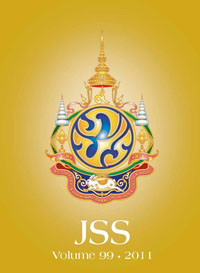The politics of defecation in Bangkok of the Fifth Reign
Main Article Content
Abstract
A series of ostensibly modernising reforms was initiated by King Rama V of Siam (who reigned from 1868 to 1910) using means both public (such as the Canal Acts of 1870 and the Police Law of 1875) and personal (the examples of himself, his household and royal court). Manuscripts from the King’s official and private correspondence in the royal archives permit the following interpretation of reasons behind his reforms. King Rama V aimed to enlarge royal authority in Bangkok by imposing his ideas of civic order and neatness. That his reforms were anti-traditional was precisely why they provoked popular opposition. The King did not simply want Bangkok to look clean and tidy—he wanted to mould the personal habits of its inhabitants, breaking Siamese customs where they were manifested as eyesores. To do so, he would import and use contemporary objects and practices (such as water closets and foreign experts like the British Medical Officer of Health). The thrust of King Rama V’s reform policy was not “modernisation”; but rather an aesthetic makeover of Bangkok and of rural Siamese attitudes towards personal hygiene and civic appearances, reflecting the monarch’s ideas of propriety in a modernizing social setting.


